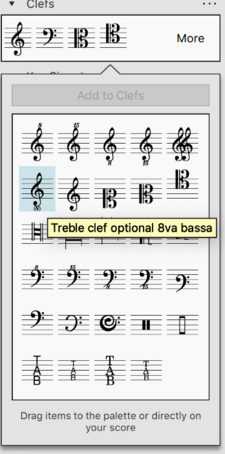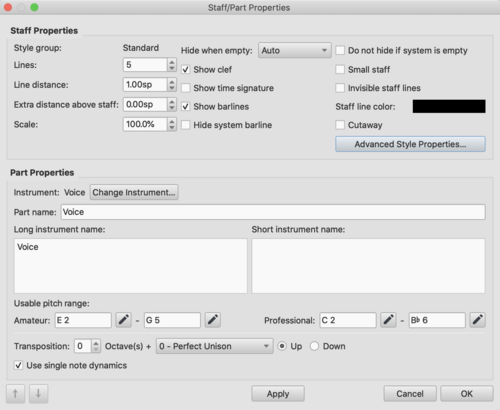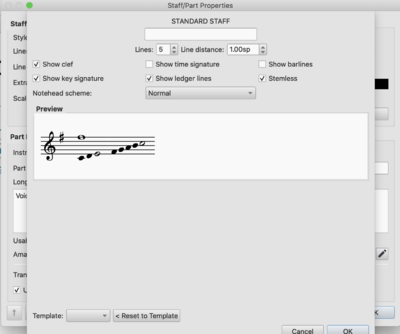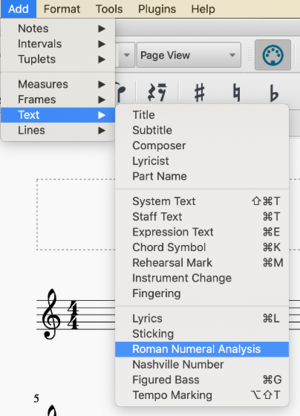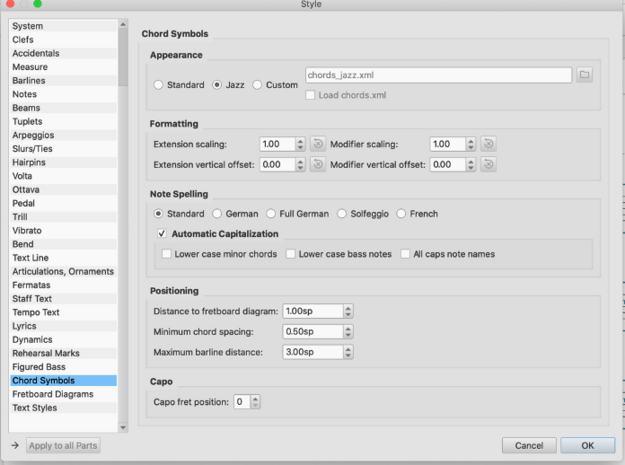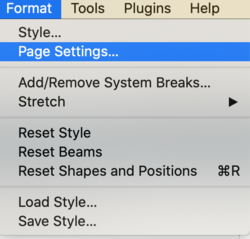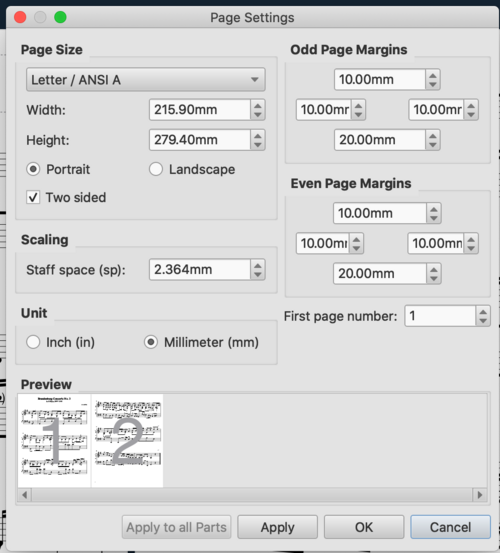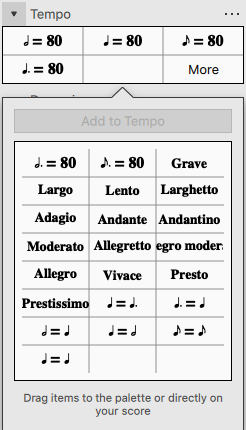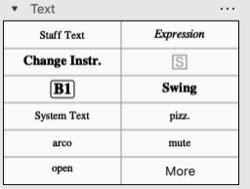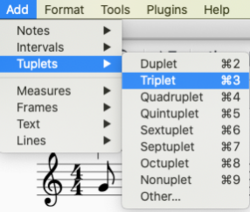Difference between revisions of "Musescore Supplement"
| Line 138: | Line 138: | ||
<i>New features</i>: | <i>New features</i>: | ||
| − | * Subdivisions | + | * Subdivisions of one note (using layers) |
| − | * Parentheses | + | * Parentheses (showing accidentals from the palette) |
<i>Features reviewed</i>: | <i>Features reviewed</i>: | ||
| Line 149: | Line 149: | ||
[[File:Accidentals.png|none|200px|right]] | [[File:Accidentals.png|none|200px|right]] | ||
| − | * | + | <i>Other refinements</i> |
| + | * Beams (using palette) | ||
[[File:Screen Shot 2020-07-31 at 7.43.50 PM.png|none|230px]] | [[File:Screen Shot 2020-07-31 at 7.43.50 PM.png|none|230px]] | ||
| − | * | + | * Size adjustment, using Format -> Page Settings -> Scaling (e.g. from ''1.764mm'' to ''2.364mm'') |
[[File:Screen Shot 2020-08-04 at 9.00.14 PM.png|none|250px]] | [[File:Screen Shot 2020-08-04 at 9.00.14 PM.png|none|250px]] | ||
Revision as of 00:10, 15 September 2020
Musescore Examples: These exercises require basic knowledge of encoding. Each exercise includes a new tool or two! The MuseScore "Play" function is also recommended.
Contents
- 1 Vocal Music in MuseScore
- 1.1 Early Vocal Music
- 1.1.1 Example 1: Chant, "Ubi caritas"
- 1.1.2 Example 2: Two-voice organum: "Kyrie, Cunctipotens genitor"
- 1.1.3 Example 3: Two-voice polyphony: Excerpt from the "Duo Agnus Dei II" of the Missa de Beata Virgine by Josquin des Prez
- 1.1.4 Example 4: Secular monophony: "Sumer is Icumen in"
- 1.1.5 Example 5: Renaissance polyphony: "Jesu, Rex admirabilis" by Giovanni Pierluigi da Palestrina (Open Score)
- 1.1.6 Example 6: Renaissance polyphony: "Jesu, Rex admirabilis" by Giovanni Pierluigi da Palestrina (Close Score)
- 1.2 Baroque-Era Vocal Music in MuseScore
- 1.1 Early Vocal Music
- 2 Instrumental music in MuseScore
- 2.1 Baroque-Era instrumental music
- 2.2 Classical/Romantic-Era Instrumental Music in MuseScore
- 2.2.1 Example 1: Symphony No. 41 in C major, K. 551 (“Jupiter Symphony”) by W. A. Mozart [Arranged for Two Pianos]
- 2.2.2 Example 2: Piano Sonata No.8, Op.13 (“Pathétique”) Second Movement by Ludwig van Beethoven
- 2.2.3 Example 3: Melody from Symphony No. 9 by Ludwig van Beethoven
- 2.2.4 Example 4: Nocturne, Op. 9 No. 1 by Fryderyk Chopin
- 2.3 20th-Century Instrumental Music in MuseScore
Vocal Music in MuseScore
Vocal music often requires the use of more features of notation software than instrumental music does. In this series of examples we represent a broad selection of samples involving features that are surpass those described in beginners' lessons.
Early Vocal Music
Example 1: Chant, "Ubi caritas"
Tools you need:
- Method 1: Choose an instrument (here use "voice," which may or may not automatically add the optional vocal tenor clef on the clef) OR
- Method 2: If not, use “clefs” from the palettes. (click the original clef then double click the treble clef)
User comments:
- I prefer using ¼ for the time signature for the sake of spacing.
- The time signature, stems, and the bar lines can be made invisible by selecting all -> staff/part properties -> advanced style properties.
- Review items: Slurs and texts from the “Octaves, Slurs, Fingerings, and Text”
Example 2: Two-voice organum: "Kyrie, Cunctipotens genitor"
- Spacing (Press Enter)
Review features:
- Notes
- Lyrics
- Chant (Hint: Staff/Part Properties)
Example 3: Two-voice polyphony: Excerpt from the "Duo Agnus Dei II" of the Missa de Beata Virgine by Josquin des Prez
Review features:
- Notes
- Clef changes
- Voices/Layers (necessary for writing two parts on one staff)
- Slurs
Example 4: Secular monophony: "Sumer is Icumen in"
New features:
- Dotted notes & rests
- Spacing – using “Enter” key
Review features:
- Notes and Lyrics
- Rests
Example 5: Renaissance polyphony: "Jesu, Rex admirabilis" by Giovanni Pierluigi da Palestrina (Open Score)
- Choosing Instruments: Choir – Soprano, Alto, and Baritone
- Taking advantage of same rhythmic values
Example 6: Renaissance polyphony: "Jesu, Rex admirabilis" by Giovanni Pierluigi da Palestrina (Close Score)
New features:
- Creating a Closed score
Review topic:
- Multiple layers. See “Voices/Layers”)
Baroque-Era Vocal Music in MuseScore
Example 1: Figured bass in "Dido’s Lament" by Henry Purcell
New feature:
- Figured Bass – Command + G
Example 2: Roman-numeral analysis in "Dido’s Lament" (Henry Purcell)
New feature:
- Roman-numeral analysis symbols from the menu - Add -> Text -> Roman Numeral Analysis
Example 3: Chord symbols added to "Dido’s Lament" by Henry Purcell
New feature:
- Chord symbol: Add -> Text -> Chord Symbol
N.B. The font can be changed so that it recognizes the superscript by changing the appearance from Standard to Jazz in the Style (use Format from the menu).
Instrumental music in MuseScore
Baroque-Era instrumental music
Example 1: Brandenburg Concerto No. 3 in G Major, BWV 1048 (J. S. Bach)
New features:
- Subdivisions of one note (using layers)
- Parentheses (showing accidentals from the palette)
Features reviewed:
- Notes
- Octaves
- Chords
- Voices/Layers
Other refinements
- Beams (using palette)
- Size adjustment, using Format -> Page Settings -> Scaling (e.g. from 1.764mm to 2.364mm)
Example 2: Minuet in G by Christian Petzold (Beginning)
- New: Grace Notes (Palette)
- New: Ornaments (can be added by searching “Ornaments” in the Palette box)
Example 3: Minuet in G by Christian Petzold (End)
- Review: Ornaments, chords, voices/layers
Classical/Romantic-Era Instrumental Music in MuseScore
Example 1: Symphony No. 41 in C major, K. 551 (“Jupiter Symphony”) by W. A. Mozart [Arranged for Two Pianos]
- Review: Fingerings
- New: Staccato (Shift + S)
- New: Instrument Choice -> Piano & Piano
- New: Tempo, choose from the Palette and then edit the text by double-clicking
- New: System Text, choose Text from the Palette
- Triplets = Add -> Tuplets -> Triplet (or command/control + 3)
Example 2: Piano Sonata No.8, Op.13 (“Pathétique”) Second Movement by Ludwig van Beethoven
- Review: Fingerings
- Review: Tempo Setting
- New: Temporary clef, drag the clef into the measure (Measure 1 in this case)
- New: Spacing = Format -> Add/Remove System Breaks
Example 3: Melody from Symphony No. 9 by Ludwig van Beethoven
- Hint: "Repeat & Jumps" from the Palette
Example 4: Nocturne, Op. 9 No. 1 by Fryderyk Chopin
- Hint: Tuplets from before, adjust the numbers of ratio to EIGHTH NOTES.
20th-Century Instrumental Music in MuseScore
Example 1: "The Peacock" from3 Hungarian Folksongs from Csík by Béla Bartók
- Review: Repeats & Jumps
- Review: Texts (tempo, expression, staff text, tremolo)
- Review: Tuplets
- Review: Accidentals, Articulations
- Review: Beams
- Review: Dynamics as well as:
- New: Crescendo / Decrescendo (Lines from the Palette)
- New: Time Signature (Palette)
- New: Look up "arpeggio" from the Palette, add to your Palette
- New: Tie = select the note(s), press shift and then + key
- New: Double Dots -> Find the "Basic edited" box on the top left corner, change it to "Advanced"
